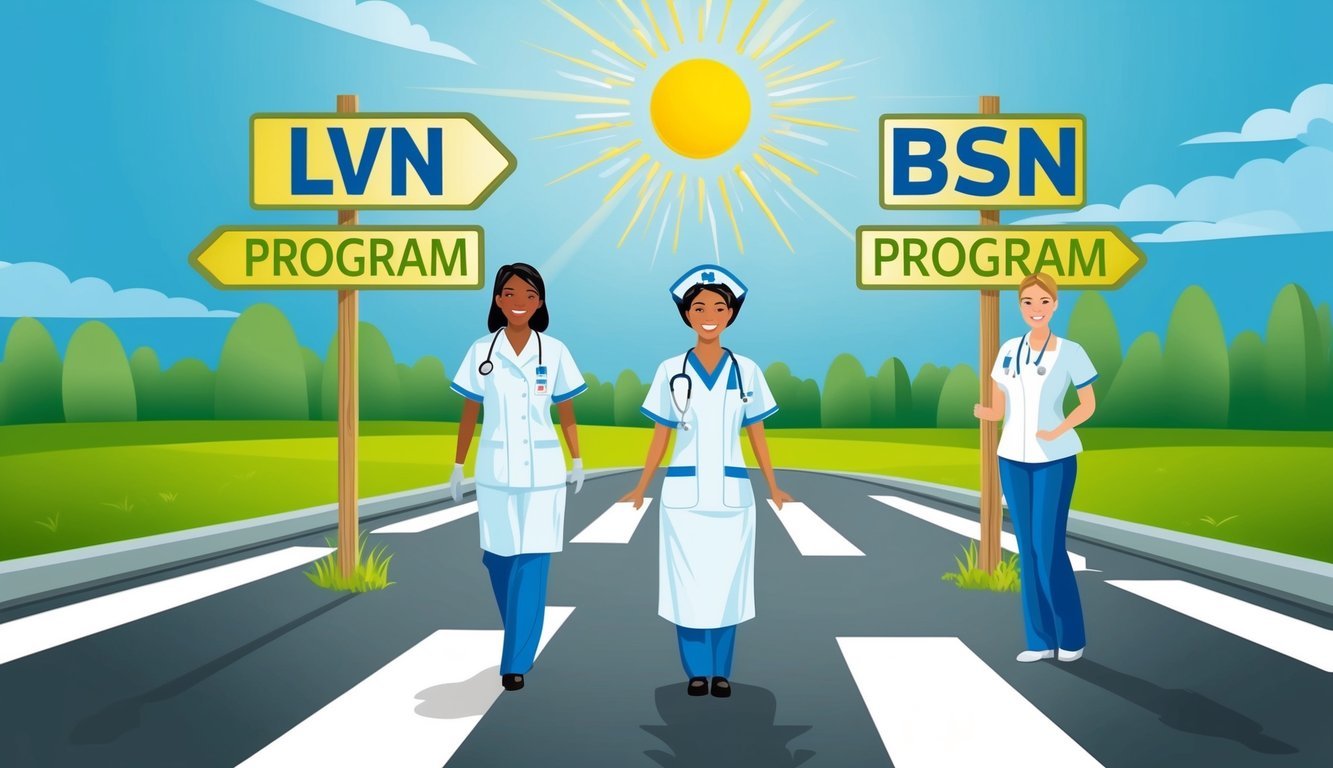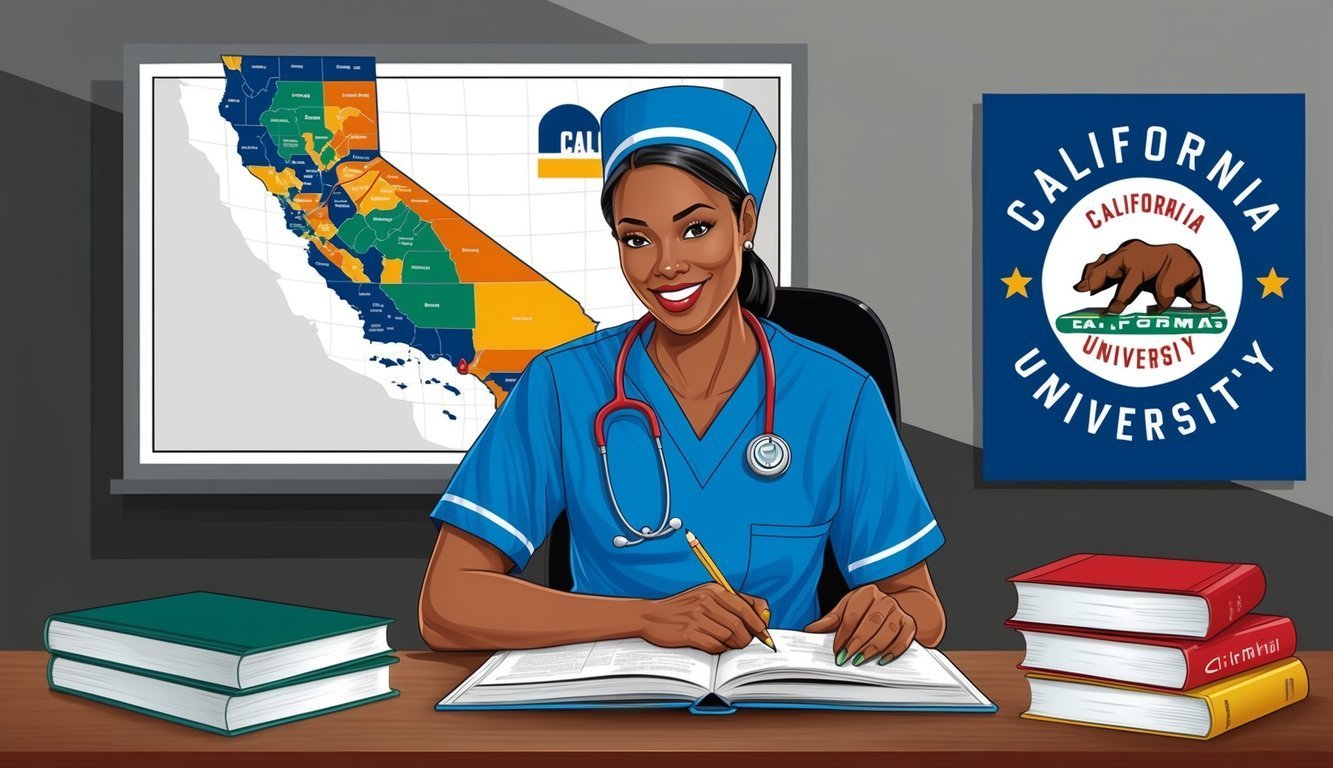If you’re a Licensed Vocational Nurse (LVN) considering advancing your career, LVN to BSN programs in California offer a valuable pathway to becoming a Registered Nurse (RN) and significantly enhancing your professional opportunities.
These programs equip you with essential nursing skills and theoretical knowledge, preparing you for a broader scope of practice and increasing your earning potential.
By pursuing a Bachelor of Science in Nursing (BSN), you position yourself for numerous job opportunities in a growing field.
In California, which has one of the highest demands for RNs, completing a BSN can lead to roles that are not only more fulfilling but also offer better salaries as compared to LVN positions.
Many institutions provide flexible options for LVNs, allowing you to balance your studies with current work commitments.
Whether you choose classroom learning or online formats, the transition from LVN to BSN is designed to be seamless.
Numerous programs in California can help you achieve this goal, providing the support and training necessary for success in the nursing profession.
Understanding LVN to BSN Programs in California
LVN to BSN programs in California offer a pathway for licensed vocational nurses to advance their education and career opportunities.
These programs equip you with the skills and knowledge needed to become a registered nurse, enhancing both your professional scope and earning potential.
What is an LVN to BSN?
An LVN to BSN program is specifically designed for individuals holding a California LVN license who want to obtain a Bachelor of Science in Nursing.
The curriculum includes advanced nursing theory, clinical practices, and holistic patient care.
Typically, these programs combine classroom instruction with hands-on clinical experience, allowing you to build on your existing nursing skills while learning new concepts.
Accredited institutions often offer these programs in various formats, including online and in-person options.
Benefits for LVNs Advancing to a BSN
Transitioning from an LVN to a BSN provides several advantages:
- Increased Opportunities: Earning a BSN opens doors to various nursing roles, including management and specialized fields.
- Higher Salaries: Registered nurses with a BSN generally earn higher salaries than those with an LVN credential. In California, the salary difference can reach approximately $60,000 on average.
- Enhanced Skills: The program prepares you for complex patient care scenarios, improving your clinical judgment and leadership abilities.
These benefits contribute to the high demand for BSN-prepared nurses in healthcare settings across California.
Overview of the Nursing Education Pathway
The pathway from LVN to BSN typically involves the completion of prerequisite courses followed by the nursing core curriculum.
-
Prerequisites: Courses may include anatomy, physiology, and microbiology. These provide the foundational knowledge necessary for advanced nursing education.
-
Core Curriculum: You will study topics such as nursing research, community health, and patient care management.
-
Clinical Rotations: Hands-on training in various healthcare settings allows you to apply theoretical knowledge in real-world situations.
Many institutions, like those highlighted by NurseJournal, provide guidance on admission requirements and program details, ensuring you are well-prepared for this advanced nursing pathway.
Eligibility and Admission Requirements

When considering admission to LVN to BSN programs in California, it is essential to understand the specific eligibility criteria and admission requirements.
These encompass academic prerequisites, licensing considerations for your career advancement, and information relevant to transfer and international students.
Academic Prerequisites
To be eligible for most LVN to BSN programs, you typically need an active LVN license as a minimum requirement.
Prerequisite coursework must be completed, which often includes subjects such as:
- Anatomy and Physiology
- Microbiology
- Nutrition
- Psychology
Many programs require you to maintain a minimum GPA, often around 2.5 or higher, in your general education and science courses.
Be mindful that some institutions may also request letters of recommendation and a personal statement as part of your application package.
For detailed information, you can refer to programs like those listed on NurseJournal.org.
NCLEX-RN Licensing Considerations
After completing your LVN to BSN program, you must pass the NCLEX-RN exam to obtain your RN license.
Preparation for this exam is critical, and many programs include focused study materials or review courses.
You may also need to provide documentation of clinical experiences, as well as proof of meeting any state-specific requirements for licensure.
Familiarizing yourself with the NCLEX-RN exam format is highly advisable to ensure a successful transition from an LVN to an RN role.
Transfer and International Student Information
If you are a transfer student, it’s vital to verify how many of your previously earned credits will be accepted.
Each program has its own policies regarding credit transfer, usually outlined on their official sites.
For international students, additional requirements may include proving English proficiency through tests like TOEFL or IELTS.
You may also need to have your educational credentials evaluated by a recognized agency for equivalency to U.S. standards.
Be sure to check with the specific programs for detailed admission procedures that cater to international applicants, as noted on Practical Nursing.
Top LVN to BSN Programs in California
California offers a variety of LVN to BSN programs across private universities, state universities, and community colleges.
Each option provides a pathway to advanced nursing knowledge and career opportunities.
Here are some of the top programs to consider.
Programs at Private Universities
Private universities in California typically offer smaller class sizes and more personalized attention.
-
Azusa Pacific University provides a robust LVN to BSN program designed for licensed vocational nurses looking to advance their education. The program emphasizes clinical experience and a Christ-centered education.
-
West Coast University allows you to complete your BSN in a flexible format, combining online coursework with hands-on clinical training. This approach is well-suited for working professionals.
-
National University features an accelerated program that can be completed in as little as 12 months. The curriculum focuses on critical thinking and clinical judgment, preparing you for complex scenarios in nursing.
State University Nursing Programs
California State University systems offer comprehensive options for your transition from LVN to BSN.
-
California State University, Fullerton emphasizes a combination of theory and practice in its nursing courses. Here, you will engage in extensive clinical rotations.
-
San Diego State University offers a competitive program aimed at equipping you with the skills needed for effective patient care. The university’s strong reputation in nursing makes it a solid choice.
-
Cal State East Bay has a flexible LVN to BSN pathway. The program supports student engagement through community partnerships for clinical placements.
Community College Bridge to BSN Options
Several community colleges also provide bridge programs that facilitate entry to BSN degrees.
-
Unitek College offers an LVN to BSN program that can be completed in about 18 months. You’ll gain practical skills and experience through hands-on learning.
-
Pacific Union College allows you to build on your existing skills while preparing for leadership roles within healthcare settings.
These institutions provide a range of options to meet your educational and career goals in nursing.
Each has unique features that can fit various personal circumstances and professional ambitions.
Academic and Clinical Curriculum

In pursuing an LVN to BSN program, you will engage in a comprehensive academic curriculum and hands-on clinical training.
This combination equips you with the essential skills and knowledge needed for a successful nursing career.
General Education and Core Nursing Courses
You will begin with general education courses that lay the groundwork for your nursing education.
Subjects typically include:
- Biology
- Chemistry
- Psychology
- Sociology
These courses provide vital insights into human behavior and biological processes.
Following these, core nursing courses cover nursing theory and practice.
You will study subjects such as:
- Nursing Fundamentals
- Pathophysiology
- Pharmacology
- Health Assessment
This foundational knowledge is critical as you advance to more specialized nursing practice training.
Specialized Nursing Practice Training
Specialized training will focus on essential nursing skills and advanced practice areas.
You may explore subjects such as:
- Maternal and Child Health Nursing
- Mental Health Nursing
- Gerontological Nursing
- Pediatric Nursing
Each course will enhance your understanding of specific patient populations and complex health issues.
You will engage in simulations and skills labs, fostering hands-on experience with techniques such as:
- IV insertion
- Patient assessments
- Emergency response
This practical training is crucial for developing confidence and competency in nursing.
Clinical Placements and Real-World Experience
Clinical placements are a core component of your education, allowing you to apply your knowledge in real healthcare settings.
You will typically complete rotations in various specialties, gaining exposure to different healthcare environments such as:
- Hospitals
- Community clinics
- Long-term care facilities
During these placements, you will work under the supervision of experienced RNs, further honing your skills in patient care and decision-making.
This hands-on experience is invaluable for understanding the realities of nursing practice and preparing for the NCLEX-RN licensure exam.
Supporting Your Nursing Career Progression

As you transition from an LVN to a BSN program in California, several resources can bolster your career trajectory.
You’ll find financial aid options, career services, and support with licensing, which are crucial elements in achieving your professional goals.
Financial Aid Options for Nursing Students
Navigating the cost of nursing education can be challenging.
Fortunately, several financial aid options are available to assist you.
-
Scholarships: Many institutions offer scholarships specifically for nursing students. These can significantly reduce tuition costs. You can explore options from organizations like the California Board of Registered Nursing.
-
Grants: Unlike loans, grants do not require repayment. Federal programs, such as the Pell Grant, can help you finance your education based on need.
-
Work-Study Programs: Some schools offer positions that allow you to work part-time while completing your studies, providing both income and relevant experience.
By understanding and utilizing these opportunities, you can alleviate financial stress and focus on your education.
Career Services and Job Placement
Many nursing programs offer robust career services to help you secure employment after graduation.
-
Resume and Interview Preparation: These services typically include workshops to develop your resume. They also have sessions to practice interview skills tailored for healthcare settings.
-
Job Fairs and Networking Events: Participate in events specifically geared toward nursing employment. These can connect you directly with potential employers.
-
Internship Opportunities: Gaining practical experience through internships can enhance your skills and make you a more competitive candidate.
Using these resources can significantly streamline your entry into the nursing workforce.
Post-Graduation Licensing and Employment
Once you graduate, you must complete the NCLEX-RN.
Here’s how to prepare:
-
NCLEX-RN Pass Rate: Research programs with high NCLEX-RN pass rates. A high pass rate reflects the quality of education you will receive.
-
Test Preparation: Consider using resources like ACHIEVE Test Prep. They offer targeted study materials to help you succeed on the exam.
-
Employment Assistance: After passing the exam, many programs will assist with job placements. They connect you with healthcare facilities actively seeking new RNs.

